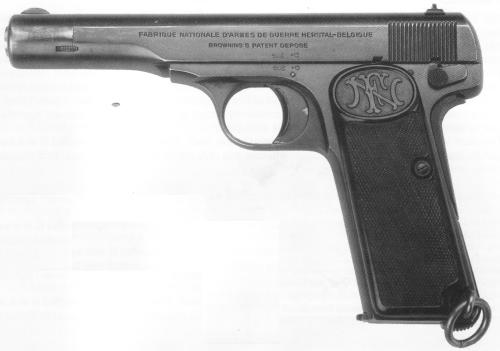
This is another 'sneak peek' at a future article. As always, comments welcome. John The FN Browning Model 1922 pistol The Kingdom of Serbs, Croats and Slovenes (later called Yugoslavia) was formed after World War I, or “the Great War.” After the Balkans Wars and WWI, the country’s stock of rifles and pistols was severely depleted, and it sought a new standard pistol. Inasmuch as the majority Serbs in the country had a relationship with the Belgian firm Fabrique Nationale de Arms de Guerre (FN) as customers dating back to the 1890s, this gunmaking colossus was an obvious choice for help. FN’s Model 1910, a John Browning design, was an early contender. This was a blowback semiautomatic design chambered for the.32 ACP or.380 ACP.
It had no external hammer, and was a popular gun in Europe, quite similar to the Colt-manufactured Model 1903 pocket pistol. The Model 1910 was somewhat famous (or notorious) for setting off World War I in 1914. It was used in the Sarajevo assassination of the Austrian archduke Franz Ferdinand and his wife Sophie. 
Production serial numbers started at approximately 200,000. (Note: All prewar Model 1922's with serial numbers below 200,000 show contract serial number ranges, while those with serial numbers above 200,000 display standard FN production serial numbers.
Some selling points were its lower price, and the fact that it could chamber the Serbs’ large stocks of 9mm Short (.380) cartridges. However, that gun was considered to be lacking in accuracy, and the Kingdom thought that a similar pistol incorporating a longer barrel would make for more precise shooting. FN really needed more business at that time, and was very interested in satisfying this potential customer.  Accordingly, knowing that the newly-formed Kingdom could not afford new development costs and tooling, FN figured out an economical way to lengthen the slide and barrel of the Model 1910 without materially increasing production costs. The solution was a forged extension cap on the slide that could accommodate a longer barrel. A number of prototypes were crafted and tested between 1921 and 1922. Experimentation was carried out with longer grip frames giving increased ammunition capacity.
Accordingly, knowing that the newly-formed Kingdom could not afford new development costs and tooling, FN figured out an economical way to lengthen the slide and barrel of the Model 1910 without materially increasing production costs. The solution was a forged extension cap on the slide that could accommodate a longer barrel. A number of prototypes were crafted and tested between 1921 and 1922. Experimentation was carried out with longer grip frames giving increased ammunition capacity.
What resulted and became officially adopted was the Model 1922, and it was to become an extremely popular gun in many countries around the world. This model became the European handgun for several decades. It was selected as a standard military pistol not only with Yugoslavia, but also with Holland, Greece, Finland, Turkey, Romania, France, Denmark, and most notably, Nazi Germany. It was manufactured by FN until the early 1980s, and a modified version was imported by the Browning Firearms Company into the United States in the post-war years.
Variously known as the Browning 1922 or 10/22, the FN Model 1922, or the Pistole 626(b) as made for the Germans, its specifications are as follows. It was chambered either for the.380 ACP (9x17mm Browning Short) or the.32 ACP (7.65x17mm SR Browning). It was a blowback striker-fired design with a magazine capacity of 8 or 9 rounds depending on caliber. It had an overall length of 7.01 inches and a barrel length of 4.49 inches. It weighed 1.61 pounds empty. The sights were fixed non-adjustable, with the rear driftable for windage. The trigger’s face was flanged, wider than its sides.